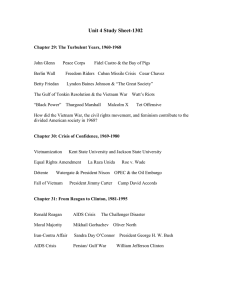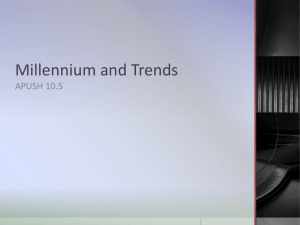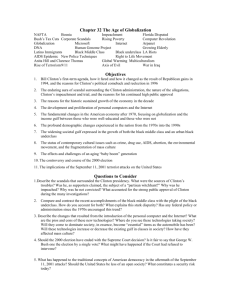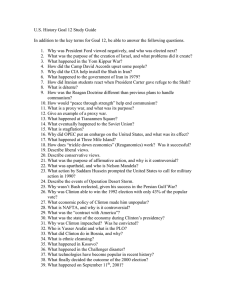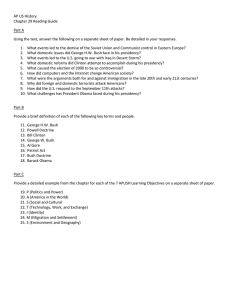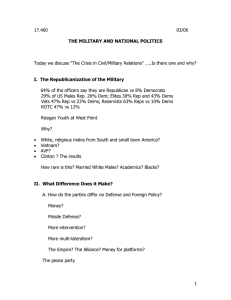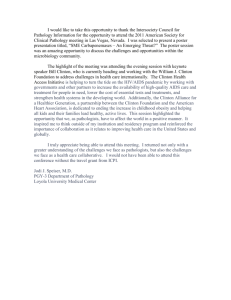Persian Gulf War and the Clinton Years Goal 12
advertisement
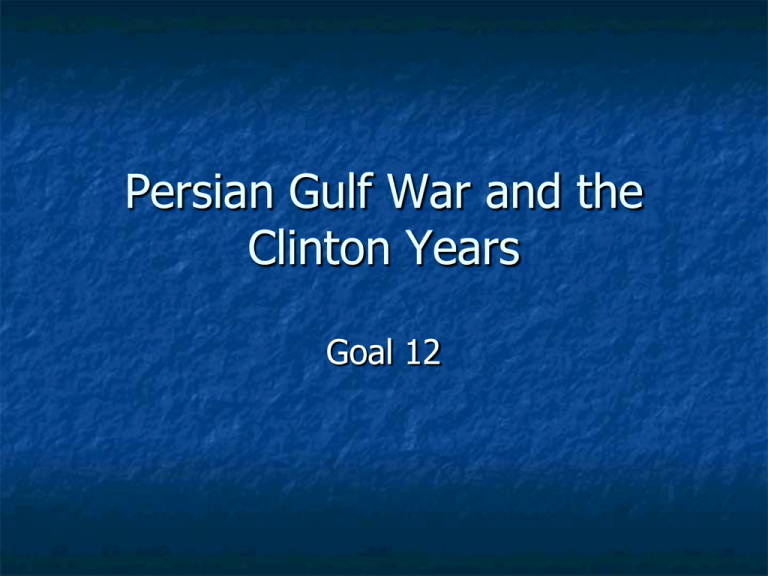
Persian Gulf War and the Clinton Years Goal 12 Essential Idea In the 1990s, the U.S. defeated Iraq in the Persian Gulf War and President Clinton helped restore the economy. Bush Elected President In 1988, George Bush, who had been Regan’s VP, ran for president and won. President Bush faced many post-Cold War challenges, especially in the Middle East. Saddam Hussein Invades Kuwait In 1990, the dictator of Iraq, Saddam Hussein, invaded his oil-rich neighbor, Kuwait. The American government feared that this invasion was the first step in an attempt to capture Saudi Arabia, which is also rich in oil. Bush Demands Iraq Back Off With the backing of the United Nations, the United States demanded that Iraq withdraw its troops. When Iraq refused, Bush authorized the use of force. Operation Desert Storm Operation Desert Storm- beginning in January of 1991, the United States (and allies) launched a massive attack. Dozens of cruise missiles and thousands of laserguided bombs fell on Iraq. After six weeks of bombing, a massive land attack was launched. Persian Gulf War Waves of tanks smashed through Iraqi lines. After just 100 hours, thousands of Iraqi troops were dead and the United States lost less than 300 . Bush declared that Kuwait was liberated , and United States troops returned home. Bush Loses Popularity Despite the success in the Persian Gulf War, Bush faced many domestic challenges. Following the end of the Cold War, America went into a recession. Many people lost jobs and the national debt was still high. Bush Loses Popularity When campaigning for president in 1988, Bush had promised “no new taxes”. The economic problems forced him to break his promise, which made him unpopular. Election of 1992 Democratic candidate Bill Clinton challenged Bush in the 1992 election. Clinton was a moderate Democrat, meaning he was less liberal. Some people disliked both Bush and Clinton. Election of 1992 The largest third party candidate in history, Ross Perot, became popular. However, Clinton won the election. Some people believe that Bush would have won if Perot had not taken votes from him (Clinton won with only 43% of the vote). How much of the popular vote did Clinton get? How much of the popular vote did Clinton get? How much of the popular vote did Ross Perot get? Electoral vote? Who might have won if Perot had not run? Clinton Raises Taxes Clinton’s first priority was to fix the economy, and felt that the budget deficit, which had grown under Regan and Bush, was the problem. In response, he raised taxes and cut spending. Clinton and Healthcare Clinton also proposed universal healthcare, and he put his wife, Hilary Clinton, in charge of creating a health care plan. However, he could not get enough support in congress for the idea, and it was never even voted on. NAFTA Clinton believed that international trade (between countries) was a way to help the economy. In 1994, he helped create NAFTA (The North Atlantic Free Trade Agreement), which meant that the United States, Mexico, and Canadawould have “free trade”. Pros and Cons of NAFTA In other words, we would not have tarifs. Many jobs were lost to Mexico (outsourcing), where its cheaper to run a factory, but it also caused American workers to get more skilled jobs. “Contract with America” In 1994, many of Clinton’s economic policies had made him unpopular. The Republican leader, Newt Gingrich, established a “Contract with America”, which would lower taxes and reform welfare programs. As a result, Republicans in Congress won the majority of seats in the 1994 election. Clinton Reelected Despite his higher taxes, Clinton took credit when the economy started to boom. Once again, Perot took votes away from the Republican challenger, Bob Dole, and Clinton won the election in 1996. In the end, America experienced one of its longest period of economic growth ever under Clinton. Under which presidents was there a budget deficit? Under which president did we have a budget surplus? Which president was the first to be famous for having a budget deficit? Middle East Tension In 1993, tensions were high once again between Israel and Palestine. Under direction of Clinton, the two sides met to discuss peace. Yasser Arafat and the PLO The Palestine Liberation Organziation, or the PLO, was headed by Yasser Arafat. Although the two leaders came to some agreements, peace in the Middle East has not yet been established. Tension in the Balkans During the 1990s, the southeastern European country of Bosnia experienced a civil war. During this time, Serbs began “ethnic cleansing”, meaning they tried to get rid of other ethnic groups. Bombing Bosnia In some cases, they would kill Muslims rather than move them. Clinton convinced NATO that military action was needed, and in 1996 troops entered the area to restore peace. Kosovo In 1998, there was fighting between two ethnic groups, Serbs and Albanians, in the Serbian province of Kosovo. Once again, Clinton convinced NATO to intervene and military force was used to restore peace. Challenger Disaster In the 1980s, space exploration had continued in the form of space shuttles. Challenger Disaster- in 1986, the Challenger space shuttle exploded shortly after take off on live television. The Rise of Technology Also, beginning in the 1980s, computers started to become a household item. Today, computers are used in cell phones as well. The internet became popular, and has now transformed the way we communicate.

